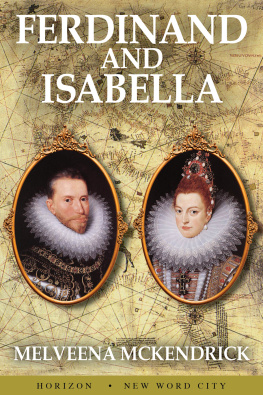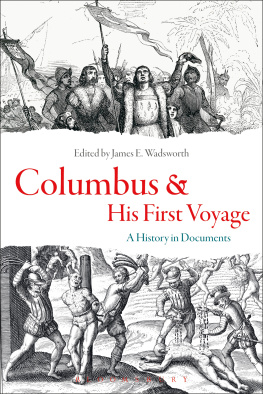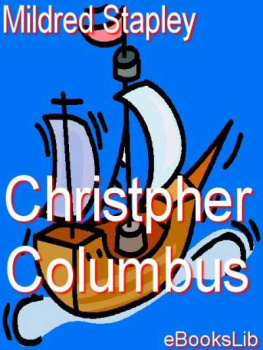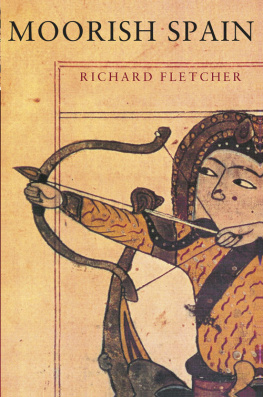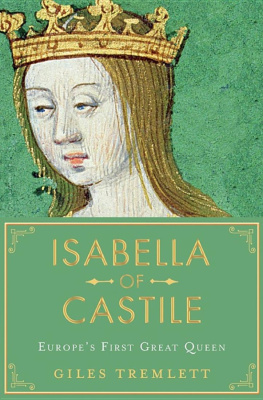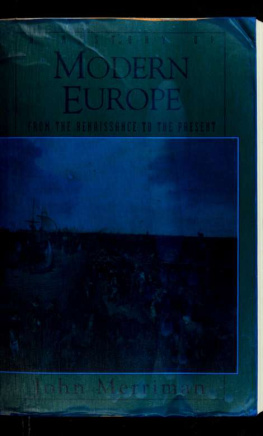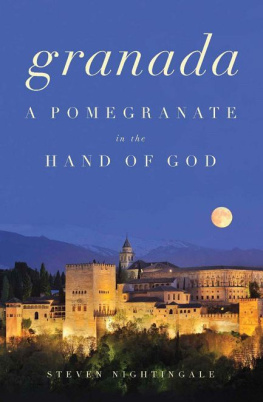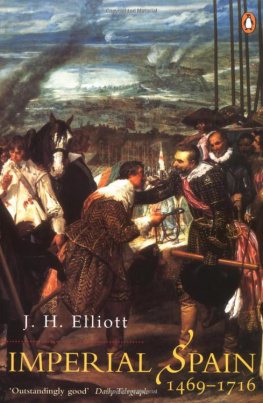PENGUIN BOOKS
SPAIN'S ROAD TO EMPIRE
Henry Kamen has taught and lectured at universities throughout the UK, USA and Spain and was most recently Visiting Professor at the University of Chicago. His books include The Spanish Inquisition and Philip of Spain. He lives in Barcelona.
HENRY KAMEN
Spain's Road to Empire
THE MAKING OF A WORLD POWER, 14921763

PENGUIN BOOKS
PENGUIN BOOKS
Published by the Penguin Group
Penguin Books Ltd, 80 Strand, London WC2R 0RL , England
Penguin Putnam Inc., 375 Hudson Street, New York, New York 10014, USA
Penguin Books Australia Ltd, 250 Camberwell Road, Camberwell, Victoria 3124, Australia
Penguin Books Canada Ltd, 10 Alcorn Avenue, Toronto, Ontario, Canada M4V 3B2
Penguin Books India (P) Ltd, 11, Community Centre, Panchsheel Park, New Delhi 110017, India
Penguin Books (NZ) Ltd, Cnr Rosedale and Airborne Roads, Albany, Auckland, New Zealand
Penguin Books (South Africa) (Pty) Ltd, 24 Sturdee Avenue, Rosebank 2196, South Africa
Penguin Books Ltd, Registered Offices: 80 Strand, London WC2R 0RL , England
www.penguin.com
First published by Allen Lane The Penguin Press 2002
Published in Penguin Books 2003
Copyright Henry Kamen, 2002
All rights reserved
The moral right of the author has been asserted
Except in the United States of America, this book is sold subject to the condition that it shall not, by way of trade or otherwise, be lent, re-sold, hired out, or otherwise circulated without the publisher's prior consent in any form of binding or cover other than that in which it is published and without a similar condition including this condition being imposed on the subsequent purchaser
ISBN: 978-0-14-192732-9
Contents
List of Illustrations
Black and white chapter illustrations and engravings
Colour plates
List of Maps
1. The European inheritance of Philip II, 1556
2. Northern Italy, c. 1650
3. Southeast Asia
4. The Caribbean and mainland
5. The viceroyalty of Peru, c. 1650
6. Population of African origin in the Americas, c. 1650
7. Southern North America in the eighteenth century
Preface
The young Alexander conquered India.
All by himself?
Caesar beat the Gauls.
Didn't he even have a cook with him?
Bertolt Brecht, Fragen eines lesenden Arbeiters
What would the whites do without the Indians?
A Guajiro Indian, New Granada, eighteenth century
When we contemplate the magnitude of Spain's hegemony, and compare it with the poverty from which it arose, we should not let ourselves give way to pride.
Ramn Carande (1969)
This book was born, in a way, on the battlefield at St Quentin, a small French town close to the border with Belgium, where in the year 1557 the king of Spain, Philip II, scored a notable victory over the army of the king of France. In my study Philip of Spain (1997) I gave a short account of the battle, based both on documents and on recent research. A distinguished historian, in reviewing the book, suggested that my account was not anti-Spanish, but nevertheless surprising because it stated that the Spanish contingent in the battle had constituted only one-tenth of the troops, thereby undermining the classic view that St Quentin was a Spanish victory. The Spanish troops may have been few, he pointed out, but they were more effective than the rest, making it a Spanish victory. In any case, he added, the victory belongs to him who paid for the battle, and that was Spain. One way or the other it must have been, and therefore was, a Spanish triumph: the battle was won by the Spanish contingent. These objections seemed perfectly reasonable, and set off in my mind a series of questions that have resulted in the present book. Who did what? Who paid for what? They are queries to which answers are not always offered. Did Corts conquer Mexico? The surprise of Bernal Daz del Castillo at reports b an official historian, Gmara, suggesting that Corts had almost single-handedly overthrown the mighty Aztec empire, was no greater than mine at finding similar claims being made by scholars about the creation of the Spanish empire.
This study, then, pursues a few questions and only a few related to the rise of Spain as a world power. It is the fruit of a meditation not only on the battle of St Quentin but also on the evolution of Spain's history, and in that sense follows the direction of much of my research in the past thirty years. Some years ago I published, by way of homage to the people and land in which I now live, an examination of the family life, society and culture of the people of Catalonia in the age of the Counter-Reformation. The present study repays other long-standing debts: to the peoples of Spain, who over the years have allowed me to know, to appreciate and to question the complex characteristics of their culture and their history.
Many notable works, from R. B. Merriman's four-volume survey, The Rise of the Spanish Empire, to Salvador de Madariaga's well-known volumes on the same theme, take Spain as the central point around which their presentation has been created. In this view, a small nation startled the world by its incredible imperial prowess, and then relapsed into an inevitable decline. The emphasis on the role of Spain and more particularly Castile in the creation of empire has a very long pedigree. This essentially imperialist and Eurocentric perspective has dominated traditional history writing. Castilians were from the first proud of their part in the empire (which they usually referred to not as an empire but as a monarchy) and therefore tended quite fairly to glorify and exaggerate their part in it. It became normal to believe, as a leading Spanish scholar of recent times did, that the Spaniard occupied Italy, and marched victoriously through the heart of Europe and over the heights of the Andes. It is hard to beat oriental perspicacity.
Much of our view of the past is permeated by myths and, as with those among us who still cling to the view that the earth is flat, there is no reason why we should not be allowed to go on cultivating them if they are harmless. The story of Spain's empire, however, is not harmless. The past, for Spaniards of today, is not a faraway country, it is an intimate part of the polemics that constitute their present and continues to be central to their political and cultural aspirations. The great age of empire is a crucial battleground in this area of myth and controversy. To the general reader the word empire implies conquest and the extension of national power. Sixteenth-century Spaniards were quite conscious that in applying the word conquistador to the adventurers of the American frontier they were claiming imperial status for the enterprise. The notion of power passed into general use, and with it the use of terms such as the Spanish conquest of America. More recently, however, historians studying imperial history have begun to call in doubt the nationalist interpretation that views expansion as a simple projection of the power of one country. They have preferred to ask questions about the nature of that power.
Power does not necessarily mean just the capacity to apply force. More exactly, it can be applied to the underlying structures that made empire possible, factors such as the ability to supply finance and services.policy of conquest in Europe without the help of allies. In the same way, Spaniards alone never had the resources to subjugate the continent of America. They drew on the help of others, both Europeans and natives of the Americas. Conquest and power turned out frequently to be of less importance than business, or the ability to marshal resources, and at various stages the Spanish world enterprise took on many of the aspects of a business empire.
Next page

